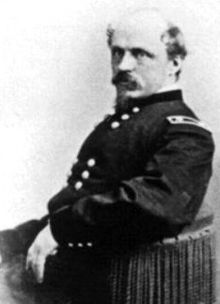Wager Swayne
Wager Swayne (born November 10, 1834 in Columbus , Ohio , † December 18, 1902 in New York City ) was a general in the US Army during the American Civil War , America's highest military award, the Medal of Honor , for his outstanding courage in the received the first battle for Corinth . In addition, he was military governor of the state of Alabama during the first days of Reconstruction between 1867 and 1868 .
Life
Wager Swayne was the son of Noah Haynes Swayne , a US Supreme Court judge . He graduated from Yale University and became a lawyer in Ohio. During the Civil War he served in the Union Army as a staff officer in one of Ohio's three year old infantry regiments . In August 1861, Ohio Governor William Dennison appointed Swayne major in the 43rd Ohio Volunteer Infantry (OVI) established at Mount Vernon . Because of its performance in the battles of Iuka and Corinth was promoted to regiment - Colonel , but also in filling the vacancy that was created by the death of the predecessor. Swayne's leadership of the 43rd Ohio Volunteer Infantry during the Atlanta Campaign later earned him promotion to brigadier general . Because of a serious wound in South Carolina , his leg had to be amputated in 1865. Swayne retired from the volunteer army later that year but remained in the regular army .
After the war, he served in the Freedmen's Bureau and moved to Alabama, where he served as military governor. He then left the army in 1870 and moved to Toledo , Ohio, where he opened a law practice. He later went to New York City in 1881, where he opened another law practice specializing in representing telegraph and railroad companies. On August 19, 1893, he was awarded the Medal of Honor. It was awarded to him for his extraordinary achievements at Corinth. Wager Swayne died on December 18, 1902 in New York City and was buried in Arlington National Cemetery.
Web link
- Wager Swayne in the database of Find a Grave (English)
| personal data | |
|---|---|
| SURNAME | Swayne, Wager |
| BRIEF DESCRIPTION | American politician and general |
| DATE OF BIRTH | November 10, 1834 |
| PLACE OF BIRTH | Columbus , Ohio |
| DATE OF DEATH | December 18, 1902 |
| Place of death | New York City |

